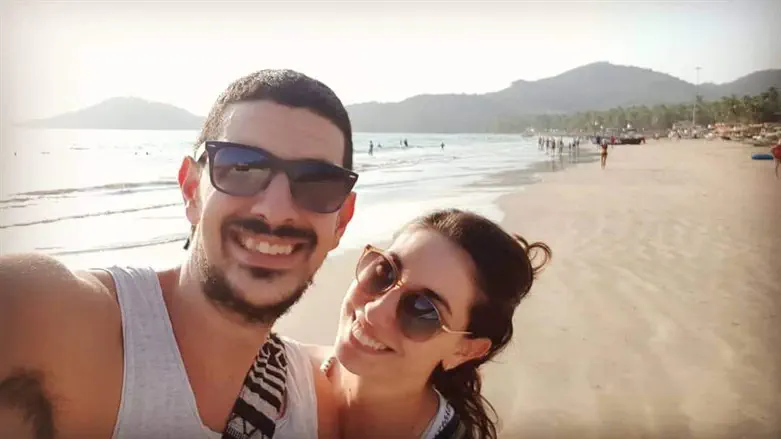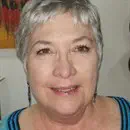
On 7 October, shortly after having arrived at Kibbutz Re’im for the Nova Music Festival, Or, 33, and Eynav, 32, were greeted with incessant sirens and missiles. With no time to park, car doors were left open; they rushed into the nearest mobile bomb shelter, one of many one can see along the roads in the Gaza Envelope. Telling the family that they would head back as soon as possible, the last words in his conversation with his mother, in answer to her question about what was happening, were, “You don’t want to know.” That was at 7:39 in the morning on October 7th.
On 11 October, Eynav’s family was notified about her murder, and on 15 October, Or’s family received official notification that he was being held hostage in Hamas captivity. Their son, Almog,2, is being looked after by both sets of grandparents and just this week returned to his preschool.
Michael Levy, 40, Or’s eldest brother, spoke with Arutz Sheva-Israel National News.
Levy first talks about Almog: “His preschool just re-opened as it had to relocate to a building with appropriate shelter in case of sirens. Because we understand that Almog’s whole world is small, we are trying to maintain at least one thing that is part of his normal routine and take him to a preschool he knows, with children he knows and childcare workers he knows.
He’s a two-year-old child and happy. He is pampered, and everyone is with him, giving him everything he needs, maybe pampering him more than necessary [Levy chuckles].
But we know it is also not easy for him. He has this behavior -- he will sit on something dangerous, say to himself, ‘You are going to fall,’ stand up, and then do it again and again. It is cute, but it seems, perhaps, that he was used to hearing that from his mother and father.”
Almog is getting psychological treatment, and we want the best treatment for him.”
Until his father returns, I say. “Yes, until his father returns.”
Then we move on to talk about Or. His name, Or, means light. From what I read about Or in preparation for this interview, it seems the name suits his personality. Michael concurs:
“Or is the kind of person who is always smiling and has a wide variety of friends, as I discovered after his abduction because we are surrounded by all his friends. He has friends from work, from school, from the music festivals he frequented, and from the army. They are all so different. This says a lot about who he is.”
When you think of him in captivity, what do you imagine?
“I imagine him together with a group of people in a particular place. He is the type who likes to help, to take care of people, to keep people happy; so, as I imagine it, he creates connections with the other hostages based on shared fate, being stuck together. And I imagine that he does what he generally does – establish deep friendships even there.
I know him as a person who copes, and he will do what he needs to do to survive. I believe that he will know how to fake a relationship with his captors if he has to. More than him needing to do that to survive, I believe the captors need to keep him alive because they need him to exploit the situation as much as possible.
Or is very intelligent, borderline genius, very technical. If anyone needs help with a television or computer or phone, Or is the one who solves this kind of problem. From a young age, he would take things apart and put them back together again. He taught himself programming languages and everything he needed to know, so I believe that even if – let's go far in this imagined scenario – and if one of the terrorists has a problem with the lights or something else, he will find a way to solve it.”
I read that you referred to him as ‘Hoshi’ – what is that about?
“I think it was at around 3 or 4 years old, that he decided he didn’t want to be called ‘Or.’ It irritated him so much he would cry. To this day, I don’t know why and I wonder if he even can say why. But one day he decided that he didn’t want to be called that, that he should be called ‘Hoshi,’ short form for Hosech (darkness). That’s how he’s saved in my phone, my daughters know him as Hoshi, and that is his nickname in our house. It’s a kind of in-joke among us brothers and our mother.”
One story leads to another and Levy continues:
“We laugh at him all the time for being the smallest - Or is 1 m 87 cm tall, and he’s the shortest. So the whole time, we laugh at him for being the little one and he refers to himself as the little one. Our father – it looks like we are his bodyguards when we stand together.
Every afternoon after getting home from school, our mother would go to sleep and we three boys would play everything possible in the living room – football, handball, basketball. Things would fall but nothing broke. [At this, Michael smiles broadly.] That’s a kind of accomplishment and I really don’t know how. It was fun.”
Moving back to the present, I ask Levy about a photo I saw of Or and Eynav in front of a hill with the words, “We are one” in big letters across it.
“That pretty much describes how they are with their friends. One of their friends told us – and you can see the connection in this story -- how they met at a music festival and they became like family. In certain situations, I find myself comforting them. This situation is as difficult for some of their friends as it is for me.”
The ‘We are one’ image was explained to INN by a friend who asked his name not be used in this article.
“ ’We are one’ is a motto of the trance culture. People are connected by their love of music. People of all professions and from all places come together at the psytrance (psychedelic trance) festivals to celebrate togetherness. Ten thousand people were at the festival in Holland where I met Or and Eynav on the plane on our way there.
So while people come from all over the world, they all speak one language – music. The music crosses all barriers of race, religion and nationality, and the motto is ‘We are one.’ It is joyous to dance together and there is a feeling of love among us. The music has power, more than words.
Of his friendship with Or and Eynav after the festival in Holland, he says:
“From that moment, countless Saturdays together, experiences, trips, parties, deep conversations. Our souls connected to each other so strongly, that we joined in an arsenal of friends that the word ‘friends’ cannot really express the connection, but family, no less than that -- family!
Life continues, and we go through all the defining moments of life together; they get married, and so do I, they bring a child into the world, and I'm with them in every moment. Usually, with the commitments that are added to life, everyone retreats to their own corner, but Or and Eynav didn't let up for a moment, and neither did I. You realize that the test of time shows that these people do not disappoint even for a single moment along the way. You discover people without arrogance and ego, without jealousy, who are happy for you as if your reason for happiness is theirs, and cheerful, light-hearted, wise. Just pure souls, people of spirit, people of love and peace!”
At the end of the conversation with Or’s brother, I wanted to know how his young daughters, a 9-year-old and twins aged 6, understand and are coping with the family trauma.
“My daughters understand – we told them pretty much from the beginning. We told them Or and Eynav were missing, then that Eynav was murdered, then that Or was kidnapped. They understand.
I see them looking into the future by their questions about how Almog will be and what he will be told. They ask how we adults are feeling.
Girls are much more sensitive than boys, certainly much more than I was at their age [smiles]. I see that it is difficult for them, each in her own way. And we also took care that they get psychological support because they are also ‘players in this horrible movie’ as it unfolds.”
May the next scene in this movie be of Or hugging his family and throwing young Almog in the air with joy.
Featured on www.israeldiaries.com

